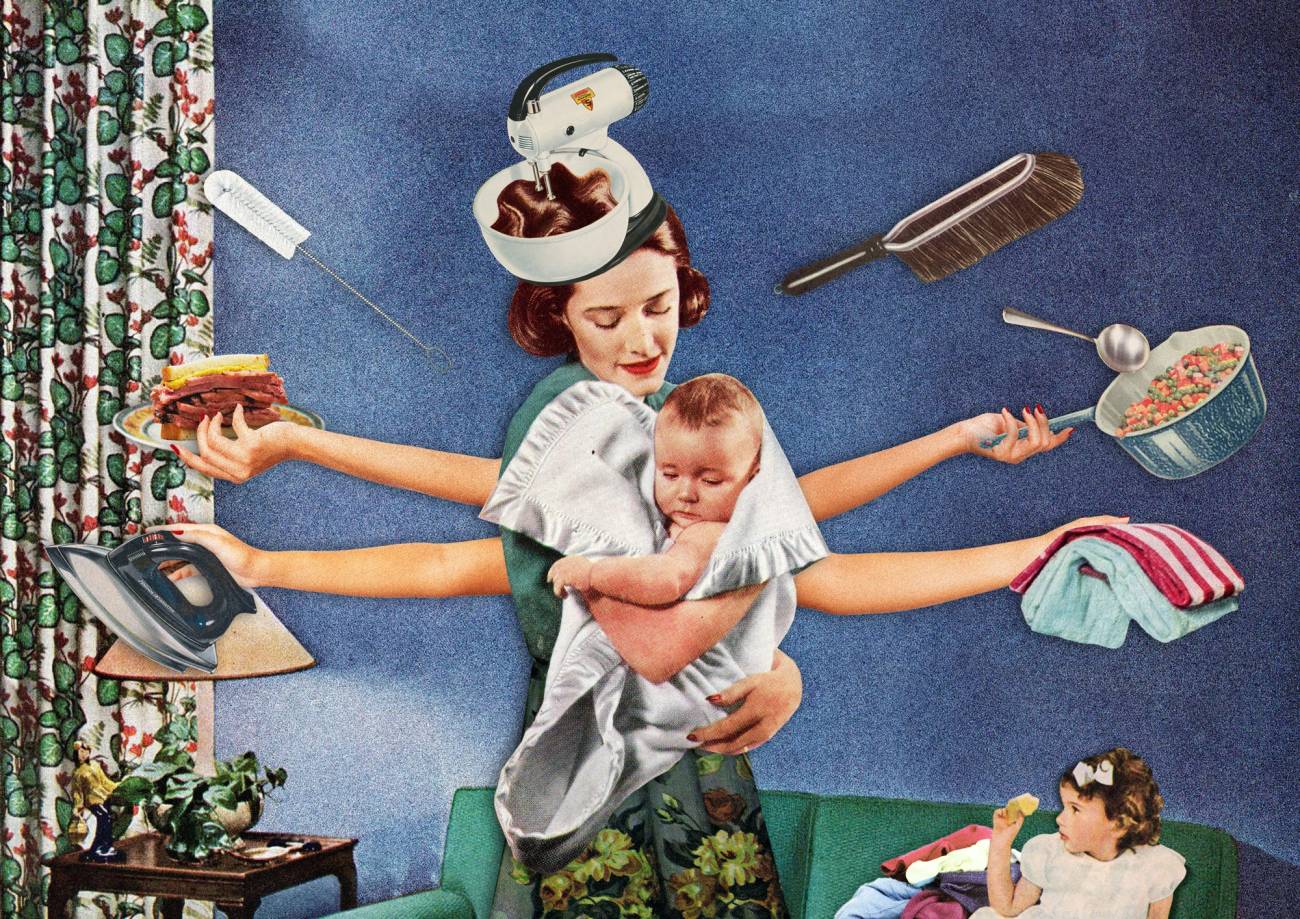Reframing the Conversation Around Parenting
Jessica Grose offers a crash course on the history of motherhood in America in her new book



Twice a week, parents around the country receive email newsletters from New York Times parenting opinion writer Jessica Grose with headlines such as “Your Kid’s Existential Dread Is Normal” and “Parents of Little Kids Still Feel They’ve Been Abandoned.” In a sea of articles and books about “how to be the perfect mother” and “how to stop a tantrum its tracks” that drowns parents, Grose writes in a straightforward and pragmatic tone that makes mothers feel seen and buoyant. Because of her unique voice, her Times newsletters are often shared on social media and sent in group chats among friends (including mine). Grose, along with other Times editors, even helped create “The Primal Scream Line,” a hotline where mothers could call in and scream it out during some of the most stressful periods of the COVID-19 crisis.
This month, Grose’s new book, Screaming on the Inside: The Unsustainability of American Motherhood, will be published. “One thing that I come back to all the time is that as difficult as parenting in 2022 feels, there are some issues that are so indelible forever. Parents have always dealt with them. There are so many historical reasons why parenting in America is so uniquely hard,” said Grose. “I really wanted to do a deep dive on history. And a book is a way to make a longer-term statement about what my orientation and ideas about American motherhood are.”
The COVID-19 pandemic put particular strain on American mothers—and saw a subsequent rise in books on parenting in this COVID-defined era. “The pandemic was a time where more people have been talking about the unrealistic expectations of American motherhood. No one’s been listening to them, and society has not really changed to make it more sustainable,” said Grose. “Every person’s experience of motherhood is their own. I tried to talk to as many people from different backgrounds, parts of the country, with different experiences as possible. And while other books have done that, not these particular people in this particular moment.”
Besides, said Grose, there still aren’t enough books on the subject. “I think motherhood is one of the most primal and fundamental topics that exists in the world,” she said. “So even though there are tons of books about motherhood, I think there should be even more.”
Screaming on the Inside gives readers a crash course in the history of motherhood in America. Grose outlines the American mother’s journey—from society believing mothers were simply a vessel to the creation of unachievable expectations that every mom is solely, completely responsible for anything and everything that happens to her child. “The expectation that a woman should be a perfect, moral vessel began at conception,” she writes. “Early modern pregnancy manuals spent a great deal of time warning women that their thought crimes could alter their growing feti, and in general, women were thought to be more susceptible to the devil while they were pregnant and postpartum.” Perhaps most shocking, Grose writes, “Scientists did not set eyes on female human eggs until 1827, and it wasn’t until the end of the nineteenth century that the equal role of egg and sperm in reproduction was fully acknowledged.”

While many of the facts and stories in the book can be disheartening and downright depressing, Grose wants to give readers a sense of optimism. Remembering how far women’s rights have come in the past half decade gives her hope. While change is slow, she’s hopeful it continues. “The rights that mothers and women have today are so brand new. It can sometimes feel like things are so difficult and they’re never going to change,” she said. “But they have changed radically in the past 50 years in a way that whenever I get depressed about how under-supported parents are in the United States, I think, well, at least I can buy my own house and have access to credit.”
Grose helps debunk myths and speaks to moms in a way that attempts to alleviate feelings of guilt and awfulness, showing us we’re all in this together. “I think I had some sort of fantasy that modern life is just incompatible with mothering and there’s some natural mom essence that we’ve destroyed. And that’s just simply not the case,” said Grose. “Women have been expressing this ambivalence, and all sorts of different emotions about motherhood for as long as they have been literate. This fantasy that if we just had a simpler life, mothering would be easier—it’s just not true. It’s always been incredibly rewarding, but difficult.”
What Grose does so accurately is describe the duality of motherhood. She gives voice to the dichotomous feelings moms often have trouble articulating about the unimaginably challenging yet joyful job of being a mother. ”She captures two things that seem like they’re really opposed to each other,” said Grose’s Times colleague Farah Miller, editorial director of the Well section. “On one hand, how hard it is to be a parent and how much it can absolutely suck the life out of you. But on the other hand, she has a really good handle on exactly why it’s also a wonderful, beautiful experience to be a mom.” That’s why Miller isn’t surprised when people respond so affirmatively to Grose’s writing. “So often, we get people saying, ‘It’s like you’re inside my head!’” Miller said.
I asked Grose what motivated her to share so much of her own story in the book. “It just feels more urgent when you know that the person who has done all this research has also lived it themselves,” she said. “I also wanted to make it clear that you can have every privilege under the sun, which I do. And that even with all of those things, the system is so unyielding and unsupportive for mothers.”
Grose doesn’t write about being Jewish in Screaming on the Inside, but in the weeks before our interview, coinciding with Rosh Hashanah, one of Grose’s Times newsletters focused on Judaism. In it, she grapples with wanting to instill a sense of Judaism in her children but being unclear on how to do it in a meaningful and authentic way.
“As my kids get older, I feel a greater sense of urgency about teaching them to be Jewish,” Grose wrote in that newsletter. “My problem is—and always has been—that I have little desire to bring them to shul. I can be ambivalent about organized religion because it has, at worst, been used as a shield for sometimes ugly and hypocritical behavior. … And yet I feel deeply connected to Judaism in a way that’s not always easy to explain. It is in my bones.”
She explained this conundrum that many Xennial parents feel: struggling to figure out our own Jewish identity while attempting to impart a Jewish identity to our children. “It’s something that is ongoing. I assumed that once my children were sentient, that I would have it figured out. But it’s not like that. It’s evolving. … It’s ongoing,” Grose told me. “I feel it more and more, that I really want them to have some sort of religious practice. I had a very traditional sort of Reform Jewish upbringing. I went to Hebrew school, I had a bat mitzvah, and I did not find any of that particularly inspiring.”
Grose says she still feels “closely connected to my roots,” so she is trying to find different ways to help her two young daughters—to whom she dedicated her book—connect to Judaism. “We’re going to take my kids to Austria in April to see where their grandparents lived and to learn about the persecution of their family,” said Grose. “I think about my grandparents and how they had these indefatigable spirits. And even though they were expelled from their country of their birth, they still spoke so highly of Vienna and the culture that surrounded them. I want to teach them that being Jewish is not just about being persecuted, though that is part of it.”
The theme of breaking down assumptions is present throughout the stories Grose tells in her book. While other “parenting” books can feel daunting, leaving readers with laundry lists of things to do, say, or play, Screaming on the Inside gives us permission to be who we are: concerned, overwhelmed parents who are just figuring out how to raise good humans. “This book is not a prescriptive guide,” said Katherine Nintzel, Grose’s book editor at HarperCollins. “What Jessica does that is so important is reframe the conversation and empower us to parent better simply by the way that we’re thinking about our children.”
This new way of thinking, and reframing, makes Grose a more authentic “parenting expert” who many mothers can relate to. “Doing the work makes you an expert, and Jessica has been deeply invested in this subject matter from many different angles for a long time,” said Nintzel. “I think the expertise comes from someone who is willing to do the journalistic research, talk to a lot of different types of people, absorb different opinions, and filter a lot of different ideas during one of the biggest American parenting crises we’ve seen in 100 years.”
Nintzel, a mother herself, is excited for readers to feel seen, the way she does from Grose’s writing. “Screaming on the Inside is a constant reminder for me that I shouldn’t be focusing on these industry standards that are nonsense,” said Nintzel.
Perhaps the most important lesson in Grose’s book comes in the introduction. “Anytime you feel guilty about not meeting some sort of insane, unachievable demand, ask yourself: Does this help me improve my relationship with my children? And does this help my community?” Grose writes. “If the answer is neither, push back. Refuse to feel the guilt and failure that plague so many of us when we are just trying to raise our families under this broken system. Instead, use that energy to fuel something different.”
“I can’t tell you what your values are, and I hope that it is clear that I’m not trying to tell you how to raise your kids,” said Grose. “I can tell you what my values are and how I figured out what was right for my family. That is the important work of motherhood. It’s not showing other people that you fit their mold or what a great mom you are in their definition.”
Jamie Betesh Carter is a researcher, writer, and mother living in Brooklyn.